Monthly Archives: February 2018
 Much as changed for my oldest grandchild, Chris Petersen over the last year. He has grown up so much. Chris and his fiancé, Karen Cruickshank got engaged and they are expecting a baby girl the 1st of June. These are exciting times for the whole family. With this baby girl, my husband, Bob and I will become great grandparents for the first time; our daughter Corrie Petersen and her husband, Kevin will become grandparents for the first time; and of course, Chris and Karen will be first-time parents. It is such a big change for all of us, and one that we can hardly wait for. Changes like that are among the greatest blessings in life. We have looked a the ultrasound photos, repeatedly, trying to envision exactly what she will look like. The ultrasound can only tell you so much about what he baby looks like…even the 3D ultrasound. Of course, new technology brings with it an even better picture, but the 4D ultrasound is more expensive. One day it will be the way it is always done, but that day in not today, so we will have to wait a little bit longer to really find out what our little baby girl will look like.
Much as changed for my oldest grandchild, Chris Petersen over the last year. He has grown up so much. Chris and his fiancé, Karen Cruickshank got engaged and they are expecting a baby girl the 1st of June. These are exciting times for the whole family. With this baby girl, my husband, Bob and I will become great grandparents for the first time; our daughter Corrie Petersen and her husband, Kevin will become grandparents for the first time; and of course, Chris and Karen will be first-time parents. It is such a big change for all of us, and one that we can hardly wait for. Changes like that are among the greatest blessings in life. We have looked a the ultrasound photos, repeatedly, trying to envision exactly what she will look like. The ultrasound can only tell you so much about what he baby looks like…even the 3D ultrasound. Of course, new technology brings with it an even better picture, but the 4D ultrasound is more expensive. One day it will be the way it is always done, but that day in not today, so we will have to wait a little bit longer to really find out what our little baby girl will look like.

With his growing family, Chris decided that the time had come to buy their home, so he found a cute little condo to buy, and he and Karen have been busily decorating it, and preparing the second bedroom for their new little addition. Buying a house is, as we all know, a really big step. Nevertheless, often the house payment is less than rent would have been. That is exactly what happened with Chris and Karen, so that has helped when it comes to the extra money to get things ready for their little girl. Buying a home is a big step, but it is also an exciting step, and Chris is no exception. Owning his own home as made him feel more like an adult, with a sense of pride in ownership.
A few months ago, Chris landed his dream job. It’s funny, as a chef Chris expected that his dream job would  have been in a restaurant, but that was not the case for Chris. Chris found his calling in the health care industry…not as a CNA, nurse, or aid, but rather as a chef. Chris works at Mountain Plaza Assisted Living, and he really loves it. Being a chef in a assisted living facility allows him to not only cook, which was his chosen career, but it allows him to have a positive effect on the lives of a really great group of people. After serving the meals, Chris gets to go out and visit with the residents, and that has been a great opportunity for him an a great perk for the residents. I am very proud of all of Chris’ accomplishments, and I’m very proud of the impact he has on the lives of those around him. for Chris, it has been a really big year. Today is Chris’ birthday. Happy birthday Chris!! Have a great day!! We love you!!
have been in a restaurant, but that was not the case for Chris. Chris found his calling in the health care industry…not as a CNA, nurse, or aid, but rather as a chef. Chris works at Mountain Plaza Assisted Living, and he really loves it. Being a chef in a assisted living facility allows him to not only cook, which was his chosen career, but it allows him to have a positive effect on the lives of a really great group of people. After serving the meals, Chris gets to go out and visit with the residents, and that has been a great opportunity for him an a great perk for the residents. I am very proud of all of Chris’ accomplishments, and I’m very proud of the impact he has on the lives of those around him. for Chris, it has been a really big year. Today is Chris’ birthday. Happy birthday Chris!! Have a great day!! We love you!!

 My mother-in-law, Joann Schulenberg, like her mother before her was blessed to be able to share her birthday with her first great grandchild, Chris Petersen. It was something the two of them really liked, and over the years, many joint birthday parties were held in their honor. It was a tradition that started when Chris’ mom, Corrie Petersen, my oldest daughter, shared her birthday with Joann’s mom, Nettie Knox. The pictures we have of those moments are something Chris and Corrie will treasure forever, just as their were treasures for their great grandmothers.
My mother-in-law, Joann Schulenberg, like her mother before her was blessed to be able to share her birthday with her first great grandchild, Chris Petersen. It was something the two of them really liked, and over the years, many joint birthday parties were held in their honor. It was a tradition that started when Chris’ mom, Corrie Petersen, my oldest daughter, shared her birthday with Joann’s mom, Nettie Knox. The pictures we have of those moments are something Chris and Corrie will treasure forever, just as their were treasures for their great grandmothers.
Unfortunately, that tradition will not be carried on through the next generation, because while my grandson Chris and his fiancé, Karen Cruickshank are making my husband Bob a great grandfather, they will miss his birthday by at least a month. Nevertheless, Chris will be the great grandchild who will make my mother-in-law a great great grandmother, but she did not live to see that day, something that makes us all very sad. She 
 lloved being a grandma, and loved those sweet babies, so I know she would have loved this next level of her ife, and totally loved the little girl who is on the way in early June.
lloved being a grandma, and loved those sweet babies, so I know she would have loved this next level of her ife, and totally loved the little girl who is on the way in early June.
When his great grandma was in the hospital for the last time, we all went up to see her, and Chris wondered if it would be ok to take pictures with her, the baby’s ultra sound, and him, so that there would be a picture for his little girl. He had been hoping for pictures of her with the baby, and also for five-generation pictures with her, his grandpa, his mom, the baby, and him. After Chris asked me about the pictures, my sister-in-law, Brenda Schulenberg suggested the same thing, so we all decided it should be done. That visit was hard, because his grandma was in and out, and Chris wasn’t sure he would be able to understand what we were trying to tell her. When the visit was over, we all left her room, except Chris. He wanted a few minutes to officially tell his great grandma that she was going to be a great great grandma…even if she wasn’t awake to hear it. Then, a little miracle happened. As Chris was talking to her, she opened her eyes and looked right at 
 him. Chris didn’t wait another second, but told her, “Grandma, I just wanted to let you know that you are going to be a great great grandma. My fiancé, Karen and I are having a baby girl in June.” His great grandma looked right at him, and she smiled with delight! Chris knew that she knew, and it brought tears to his eyes. It was the ultimate gift for both of them, and I am so glad that she got to know this great news before her passing just a few days later. Today would have been her 87th birthday. Happy birthday in Heaven Mom. We love and miss you very much.
him. Chris didn’t wait another second, but told her, “Grandma, I just wanted to let you know that you are going to be a great great grandma. My fiancé, Karen and I are having a baby girl in June.” His great grandma looked right at him, and she smiled with delight! Chris knew that she knew, and it brought tears to his eyes. It was the ultimate gift for both of them, and I am so glad that she got to know this great news before her passing just a few days later. Today would have been her 87th birthday. Happy birthday in Heaven Mom. We love and miss you very much.
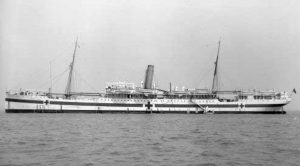 Hospitals and hospital ships should be off limits during a war…even to the enemy. Some things should be considered sacred n the work hospitals do, should not be attacked. Unfortunately, that doesn’t always seem to matter. The Glenart Castle was a hospital ship during World War I. On March 1, 1917, the ship suffered damaged when she struck a mine in the English Channel 8 nautical miles northwest of the Owers Lightship on 1 March 1917. The ship was repaired and returned to service. That damage was accidental. What happened later was not.
Hospitals and hospital ships should be off limits during a war…even to the enemy. Some things should be considered sacred n the work hospitals do, should not be attacked. Unfortunately, that doesn’t always seem to matter. The Glenart Castle was a hospital ship during World War I. On March 1, 1917, the ship suffered damaged when she struck a mine in the English Channel 8 nautical miles northwest of the Owers Lightship on 1 March 1917. The ship was repaired and returned to service. That damage was accidental. What happened later was not.
On February 26, 1918, Glenart Castle was leaving Newport, South Wales, on its way to Brest, France. Fishermen in the Bristol Channel saw her clearly lit up as a hospital ship. That was supposed to let everyone know that they were not to fire on the ship. John Hill, a fisherman on Swansea Castle, remembered “I saw the Hospital Ship with green lights all around her – around the saloon. She had her red side lights showing and mast-head light, and also another red light which I suppose was the Red Cross light.” Nevertheless, being lit up did nothing for the Glenart Castle. At 04:00, Glenart Castle was hit by a torpedo in the number 3 hold. The blast destroyed most of the lifeboats, and the subsequent pitch of the vessel as I listed hindered attempts to launch the remaining boats. In the eight minutes the ship took to sink, only seven lifeboats were launched. Rough seas and inexperienced rowers swamped most of the boats.
Of the 194 people o board, only 32 survived. A total of 162 people were killed, including the Captain, Bernard Burt, eight nurses of the Queen Alexandra’s Imperial Military Nursing Service, seven Royal Army Medical Corps (RAMC) medical officers and 47 medical orderlies. Of the hospital patients being treated on board, a total of 99 died. The matron of Glenart Castle, Miss Kate Beaufoy (1868-1918), was among those killed in the sinking. Beaufoy was a veteran of the South African War and the Gallipoli campaign. She kept a diary of her time on the ship. It is all her family has now. Evidence was found suggesting that the submarine that fired the torpedo may have shot at initial survivors of the sinking in an effort to cover up the sinking of Glenart Castle. It wasn’t bad enough that the hospital ship had been sunk, but they tried to make sure there were no survivors too. The body of a junior officer of Glenart Castle was recovered from the water close to the position of the sinking. It was marked with two gunshot wounds, one in the neck and the other in the thigh. The body also had a life vest indicating he was shot while in the water.
After the war, the British Admiralty sought the captains of U-Boats who sank hospital ships, in order to charge them with war crimes. Kapitänleutnant Wilhelm Kiesewetter, the commander of UC-56, was arrested after the 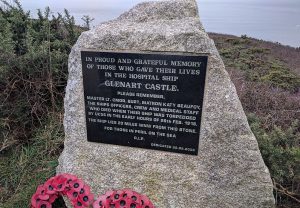 war on his voyage back to Germany and interned in the Tower of London. He was released on the grounds that Britain had no right to hold a detainee during the Armistice. To my knowledge, he never paid for his crimes. A memorial plaque was dedicated on the 84th anniversary of the sinking, February 26, 2002 near Hartland Point. The plaque’s inscription read, “In proud and grateful memory of those who gave their lives in the hospital ship Glenart Castle. Please remember, Master Lieutenant Commander Burt, Matron Katy Beaufoy, the ships officers, crew and medical staff who died when their ship was torpedoed by UC-56 in the early hours of 26th Feb 1918. The ship lies 20 miles WNW from this stone. For those in peril on the sea. R.I.P. Dedicated 26.02.2002.”
war on his voyage back to Germany and interned in the Tower of London. He was released on the grounds that Britain had no right to hold a detainee during the Armistice. To my knowledge, he never paid for his crimes. A memorial plaque was dedicated on the 84th anniversary of the sinking, February 26, 2002 near Hartland Point. The plaque’s inscription read, “In proud and grateful memory of those who gave their lives in the hospital ship Glenart Castle. Please remember, Master Lieutenant Commander Burt, Matron Katy Beaufoy, the ships officers, crew and medical staff who died when their ship was torpedoed by UC-56 in the early hours of 26th Feb 1918. The ship lies 20 miles WNW from this stone. For those in peril on the sea. R.I.P. Dedicated 26.02.2002.”
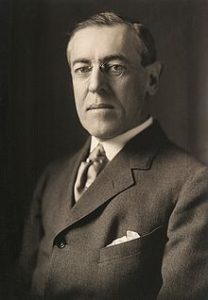 The United States has tried to stay out of most of the wars the rest of the world has become involved in, but sometimes circumstances have drawn us into wars we didn’t want to enter. World War I is a prime example of just such a situation. On February 26, 1917, President Woodrow Wilson learns of the so-called Zimmermann Telegram. The telegram was a message from German Foreign Secretary Arthur Zimmermann to the German ambassador to Mexico proposing a Mexican-German alliance in the event of a war between the United States and Germany. This telegram was a crucial step toward the entry of the United States into World War I.
The United States has tried to stay out of most of the wars the rest of the world has become involved in, but sometimes circumstances have drawn us into wars we didn’t want to enter. World War I is a prime example of just such a situation. On February 26, 1917, President Woodrow Wilson learns of the so-called Zimmermann Telegram. The telegram was a message from German Foreign Secretary Arthur Zimmermann to the German ambassador to Mexico proposing a Mexican-German alliance in the event of a war between the United States and Germany. This telegram was a crucial step toward the entry of the United States into World War I.
On February 24, 1917, British authorities gave Walter Hines Page, the United States ambassador to Britain, a copy of the Zimmermann Telegram. It was a coded message from Zimmermann to Count Johann von Bernstorff, the German ambassador to Mexico. 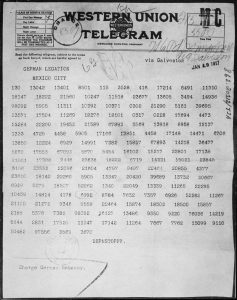 In the telegram, which was intercepted and deciphered by British intelligence in late January, Zimmermann instructed his ambassador, that in the event of a German war with the United States, to offer significant financial aid to Mexico, provided Mexico agreed to enter the conflict as a German ally. Germany also promised to restore to Mexico the lost territories of Texas, New Mexico and Arizona. Now, when you think about it, that is some big promises for Germany to be making, but I supposed that if the event of a loss in the war, all promises were null and void.
In the telegram, which was intercepted and deciphered by British intelligence in late January, Zimmermann instructed his ambassador, that in the event of a German war with the United States, to offer significant financial aid to Mexico, provided Mexico agreed to enter the conflict as a German ally. Germany also promised to restore to Mexico the lost territories of Texas, New Mexico and Arizona. Now, when you think about it, that is some big promises for Germany to be making, but I supposed that if the event of a loss in the war, all promises were null and void.
Upon learning about the proposed agreement between Germany and Mexico, the State Department was quick to send a copy of the Zimmermann Telegram to 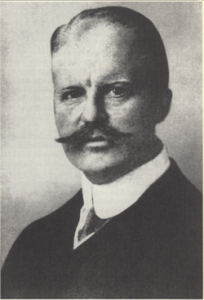 President Wilson. The president was shocked by the note’s content and the next day proposed to Congress that the United States should start arming its ships against possible German attacks. Wilson also authorized the State Department to publish the telegram. It appeared on the front pages of American newspapers on March 1, and it left many Americans horrified. The telegram was quickly declared a forgery by the public, but two days later, Zimmermann himself announced that it was genuine.
President Wilson. The president was shocked by the note’s content and the next day proposed to Congress that the United States should start arming its ships against possible German attacks. Wilson also authorized the State Department to publish the telegram. It appeared on the front pages of American newspapers on March 1, and it left many Americans horrified. The telegram was quickly declared a forgery by the public, but two days later, Zimmermann himself announced that it was genuine.
The Zimmermann Telegram helped turn the American public, already angered by repeated German attacks on United States ships, firmly against Germany. On April 2, President Wilson, who had initially sought a peaceful resolution to World War I, urged immediate United States entrance into the war. Four days later, Congress declared war against Germany, and the United States entered World War I on April 6, 1917.
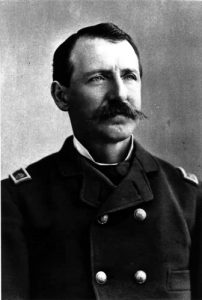 When people go missing these days, we are often not surprised. People seem to go missing all the time. Of course, most of them are murdered, or believed to be murdered. Very few are ever seen again, and as often as not, no one is ever prosecuted for their murder. This is not necessarily a new situation either. On February 1, 1896, one Albert Jennings Fountain and his eight year old son, Henry went missing near White Sands, New Mexico on their way home, after Fountain had attended a court term in Lincoln County. Mrs Fountain reported the two missing, and a search party was sent out the next day. On the Tularosa-Las Cruces road, about 45 miles from his home, the buckboard and team were found, along with Fountain’s papers, several empty cartridge casings, and two pools of blood. Missing were Fountain, his son, and Albert’s Winchester rifle.
When people go missing these days, we are often not surprised. People seem to go missing all the time. Of course, most of them are murdered, or believed to be murdered. Very few are ever seen again, and as often as not, no one is ever prosecuted for their murder. This is not necessarily a new situation either. On February 1, 1896, one Albert Jennings Fountain and his eight year old son, Henry went missing near White Sands, New Mexico on their way home, after Fountain had attended a court term in Lincoln County. Mrs Fountain reported the two missing, and a search party was sent out the next day. On the Tularosa-Las Cruces road, about 45 miles from his home, the buckboard and team were found, along with Fountain’s papers, several empty cartridge casings, and two pools of blood. Missing were Fountain, his son, and Albert’s Winchester rifle.
Albert Jennings Fountain was born in Staten Island, New York on October 23, 1838 to Solomon Jennings, a sea captain, and Catherine de la Fontaine Jennings, Albert grew up to go to Columbia College before traveling all over the world as a tutor. He then settled in California, where he worked at a newspaper before studying law in San Francisco. Though the reasons are unknown, Albert began to go by the name of “Albert Jennings Fountain,” an Anglicized version of his mother’s family name. In August, 1861 he enlisted in the Union Army and was commissioned as an officer in California Column. He participated in the Union conquest of the Confederate Territory of Arizona and fought at the Battle of Apache Pass.
During his time in the army, he married Mariana Perez in October, 1862 and the two would go on to have nine children. By the time he was discharged at the end of the Civil War, Albert had obtained the rank of captain. He and his family settled in El Paso, Texas, where he went to work for the United States Property Commission, which investigated and disposed of former Confederate property. Later he worked as a Customs Collector, was appointed an election judge, and the Assessor and Collector of Internal Revenue for the Western District of Texas. With this background, it is not surprising that he decided to try politics and in 1869, he won a seat in the Texas Senate. Fountain’s radical Republican views angered many Texas Democrats…my kind of guy. During the El Paso Salt War, Albert got into a shootout with a man named B. Frank Williams on December 7, 1870. Albert was wounded three times, but he killed Williams.
In 1875, the Fountain family moved to Mesilla, New Mexico, where his wife was from. It was here that Fountain began his law practice. Southern New Mexico, at that time, was still subject to frequent Indian raids and in 1878, Fountain became a captain in the first company of militia in southeast New Mexico, fighting in the campaigns against Chief Victorio and Geronimo. Continuing to serve in the militia, Fountain would reach the rank of colonel, a title that he was called for the rest of his life. In 1881, he was appointed to defend Billy the Kid in his charge for murder. In 1885, Fountain moved to Las Cruces to prosecute Federal land frauds. In 1888, he was elected to the New Mexico legislature, eventually becoming speaker of the house. Afterwards, he became a special prosecutor for livestock associations. In 1894 convicted 20 men for cattle rustling. His work as a politician and an attorney acquired numerous enemies for Albert, a fact that would prove to be fatal.
After an investigation into the disappearence, it was thought that a noted New Mexico gunman and rancher named Oliver M. Lee, along with two of his employees named Jim Gililland and William “Billy” McNew had perpetrated the crime. Eventually, all three were tried for the crime, but were acquitted for lack of evidence, namely the bodies, and the case remained open, with the Fountain bodies having never been found. Some historians also believe that the famed Sheriff Pat Garrett was assassinated while heavily investigating the Fountain murder, and that he might have been getting close to answering the age old question, “who done it”.

 My grand niece, Christina Masterson and my granddaughter, Shai Royce were like two peas in a pod as kids. Unfortunately, now that they live far apart, they don’t get to spend much time together. Nevertheless, they pretty much crammed a lifetime of mischief into those young years…like most kids. The things they used to do, while not really bad, were a part of the same shock factor actions of the kids today. I remember Shai being in my car, and suddenly yelling out the window at someone on the street, “Hi!!” After they looked at her, and me like we were crazy, she told me that she and Christina do that all the time. In my day, we didn’t want to look like the nut case in town, but apparently in their day, it was the cool thing to do. I guess I should be thankful that they were not the boys with their jeans around their knees. When I was a kid, it was the kids who didn’t want to be seen with the parents because they “might” do something embarrassing. So, now I guess it’s the in thing to be embarrassing, but I can promise you that, if I did that from their car, they would be quick to tell me in a shocked voice, “Grandma/Aunt Caryn, what are you doing?? Shhhhhh!!!” Apparently, I’ll never be back in the cool generation…sigh!!
My grand niece, Christina Masterson and my granddaughter, Shai Royce were like two peas in a pod as kids. Unfortunately, now that they live far apart, they don’t get to spend much time together. Nevertheless, they pretty much crammed a lifetime of mischief into those young years…like most kids. The things they used to do, while not really bad, were a part of the same shock factor actions of the kids today. I remember Shai being in my car, and suddenly yelling out the window at someone on the street, “Hi!!” After they looked at her, and me like we were crazy, she told me that she and Christina do that all the time. In my day, we didn’t want to look like the nut case in town, but apparently in their day, it was the cool thing to do. I guess I should be thankful that they were not the boys with their jeans around their knees. When I was a kid, it was the kids who didn’t want to be seen with the parents because they “might” do something embarrassing. So, now I guess it’s the in thing to be embarrassing, but I can promise you that, if I did that from their car, they would be quick to tell me in a shocked voice, “Grandma/Aunt Caryn, what are you doing?? Shhhhhh!!!” Apparently, I’ll never be back in the cool generation…sigh!!
Christina and Shai were born just 5 days apart, and they were among 6 of my parent’s grandchildren born over a three year period…all the rest of those grandkids were boys. I guess the girls would have to stick together. They would try to hide out away from the boys, but you know how little boys are. They did their very best to torment the girls. That of course resulted in much screaming from the girls. They could make it sound like mass murder, when it was simply that the boys were in the same room…or the same universe for that matter. And telling them to ignore them, you received a look like, “what does that even mean?” They just thought it was their right to ask for the removal of the offending boy, preferably to a different family. Of course, the main tormenter cousin was my grandson, Caalab Royce…Shai’s brother. That made matters far worse. Not only was he wanting to play, but Shai was around him all the time, so the screaming was more like howling!!! Caalab was always a true teaser, and the girls were his favorite target. I can’t tell you how many times Shai told me she wanted to have he adopted…by any other family in the world!! Thankfully, the three of them are the best of friends these days…who would have thought.
A number of years ago, Christina moved to Colorado to live with her mom, and finished growing up there. I have to admit that while the drama of those prior years drove me and their moms crazy, I missed it too. Christina graduated from high school, and went on to study dental hygiene. When she was done with school she got a place of her own, and in true Drama Queen Fashion, she has decorated her apartment with all the girlie, drama queen things. I don’t know about the rest of the apartment, but Christina has a pink living room, and I have to admit, drama queen or not, I think its really cute!! Today is Christina’s birthday. Happy birthday Christina!! Have a great day!! We love you!!

 Like most of the Schulenberg men, my brother-in-law Ron Schulenberg is a work-a-holic. When he isn’t working as a diesel mechanic at Wyoming Machinery, he is working on a car at his own house. This year Ron also put a roof on the family home and put up a fence around the yard. Like any work-a-holic, he spends an average of 16 working hours a day, and then comes in to spend time with his favorite people, his wife Rachel and his son Tucker, and the dogs of course. Weekends often find him working with his nephew, Barry or brother, Bob, both of whom are work-a-holics too. The men cut wood or work on cars. The main good news about all this for Rachel is the fact that she knows where to find him. That’s the way I always felt about Bob’s work.
Like most of the Schulenberg men, my brother-in-law Ron Schulenberg is a work-a-holic. When he isn’t working as a diesel mechanic at Wyoming Machinery, he is working on a car at his own house. This year Ron also put a roof on the family home and put up a fence around the yard. Like any work-a-holic, he spends an average of 16 working hours a day, and then comes in to spend time with his favorite people, his wife Rachel and his son Tucker, and the dogs of course. Weekends often find him working with his nephew, Barry or brother, Bob, both of whom are work-a-holics too. The men cut wood or work on cars. The main good news about all this for Rachel is the fact that she knows where to find him. That’s the way I always felt about Bob’s work.
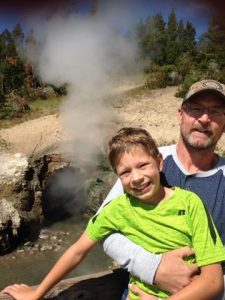

Ron loves grilling, and really knows his way around a barbeque grill. That seems to be another trait of the Schulenberg men…including my father-in-law, Walt Schulenberg, who was just like his sons and grandsons. Of course, these days, Ron has a helper with all his activities. His son Tucker, his sidekick, is right there doing whatever his dad is doing, be it working, playing, or grilling. They are best buddies, and they are perfectly happy to have each other to count on for help on their projects. It’s important to have an assistant for these things, and Tucker would rather be working with his dad, than almost anything else in the world.
While Ron is a work-a-holic, and like getting things done, he does like his relaxation time too. He enjoys 
 traveling. The family took a trip to New York a while back and really enjoyed Niagara Falls. Ron really enjoys his work, but the reality is that we work to make a better life for our family. Work is a means to an end…a better family life. I can’t picture Ron never getting out there and working…at least not until he is really, really old, but I think that if you ask Ron how he feels about the things he does in life, he would simply say, “I’d rather be camping!” Today is Ron’s birthday. Happy 50th birthday Ron!! Have a great day!! We love you!!
traveling. The family took a trip to New York a while back and really enjoyed Niagara Falls. Ron really enjoys his work, but the reality is that we work to make a better life for our family. Work is a means to an end…a better family life. I can’t picture Ron never getting out there and working…at least not until he is really, really old, but I think that if you ask Ron how he feels about the things he does in life, he would simply say, “I’d rather be camping!” Today is Ron’s birthday. Happy 50th birthday Ron!! Have a great day!! We love you!!
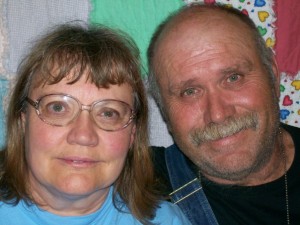
 My sister-in-law, Debbie Cook leads a pretty busy life. During the school year, she is the “bus driver” for her two youngest grandchildren, Easton Moore and Kaytlyn Griffith after school. The older kids, Weston Moore and Jala Satterwhite have activities that go on after school, so Debbie has just the little ones. Debbie likes to do special things for the grandkids, such as the brownies she made as a treat for Valentine’s Day. Of course, when its nice outside, there is a lot more that can be done, like going to the park, where they can run and play, which is probably to their parents liking too, because then they are more settled at night…or is does that only work on the little ones?
My sister-in-law, Debbie Cook leads a pretty busy life. During the school year, she is the “bus driver” for her two youngest grandchildren, Easton Moore and Kaytlyn Griffith after school. The older kids, Weston Moore and Jala Satterwhite have activities that go on after school, so Debbie has just the little ones. Debbie likes to do special things for the grandkids, such as the brownies she made as a treat for Valentine’s Day. Of course, when its nice outside, there is a lot more that can be done, like going to the park, where they can run and play, which is probably to their parents liking too, because then they are more settled at night…or is does that only work on the little ones?
Winter is a dreaded time for lots of people, an most especially for anyone who like to got camping. Debbie and her husband, Lynn love to go camping, and I think that they would move to the mountains if it weren’t for the fact that the kids and grandkids live in town. So the next best thing is family camping trip to the Big Horn Mountains. Their daughter Machelle, told me that going camping with the family every weekend is so peaceful and quiet and that they al really enjoy it. Machelle says it is like having a sleepover every weekend. Now when you think about it, which of us wouldn’t love to go home sometimes to relive the days of our youth…especially the ones when you and your siblings had a sleepover on the living room floor. That’s kind of how it feels to the family when they are all camping together in the beauty of the mountains.
Her family is the most important thing to Debbie. She loves being around the grandchildren, and especially having them all want to go camping together. It’s like taking weekly vacations together all your life. Most 
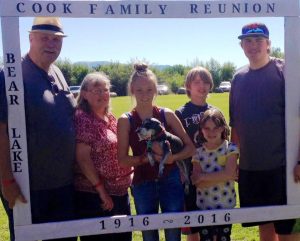 people quit taking together vacations when they get married, so it’s something special. I suppose that with the next generation coming of age, things are likely to change. When the grandkids are driving and working, they can’t always go along on the fun stuff, and they are old enough to stay alone, so things slowly change. Hopefully it doesn’t change too fast. Today is Debbie’s birthday. Happy birthday Debbie!! Have a great day!! We love you!!
people quit taking together vacations when they get married, so it’s something special. I suppose that with the next generation coming of age, things are likely to change. When the grandkids are driving and working, they can’t always go along on the fun stuff, and they are old enough to stay alone, so things slowly change. Hopefully it doesn’t change too fast. Today is Debbie’s birthday. Happy birthday Debbie!! Have a great day!! We love you!!

 As the three year mark since my mom, Collene Spencer went to Heaven arrives, I realize more and more how many time I have wanted to go to her and ask a question, get her advise, or just hear what she thought of my most recent story. Mom was, after all, my biggest fan. It didn’t matter what I wrote about, she liked it. And so often, she was part of it. She answered my many questions about the family, told me the inspirational things that happened, or the funny things her siblings would dream up. Hearing her talk about it all made me feel like I was there watching her and her siblings growing up. I could feel the coziness of my grandparents house, and hear the laughter of the kids in the kitchen as they did the dishes or helped with cooking the evening meal. Mom created that exclusive viewing for me, and I have felt very privileged to have been able to take that little tour into her history with her. Now that she is in Heaven, I find myself with more questions to ask her, and I really wish that Heaven had a telephone, so I could hear her voice and ask her the things that I want to know, because in Heaven, our minds have perfect recall, so the stories would be even more rich with detail.
As the three year mark since my mom, Collene Spencer went to Heaven arrives, I realize more and more how many time I have wanted to go to her and ask a question, get her advise, or just hear what she thought of my most recent story. Mom was, after all, my biggest fan. It didn’t matter what I wrote about, she liked it. And so often, she was part of it. She answered my many questions about the family, told me the inspirational things that happened, or the funny things her siblings would dream up. Hearing her talk about it all made me feel like I was there watching her and her siblings growing up. I could feel the coziness of my grandparents house, and hear the laughter of the kids in the kitchen as they did the dishes or helped with cooking the evening meal. Mom created that exclusive viewing for me, and I have felt very privileged to have been able to take that little tour into her history with her. Now that she is in Heaven, I find myself with more questions to ask her, and I really wish that Heaven had a telephone, so I could hear her voice and ask her the things that I want to know, because in Heaven, our minds have perfect recall, so the stories would be even more rich with detail.
Of course, the telephone call would not be just to ask her the many questions I still have, but also to hear her voice again, and my dad’s voice too. It has been so very long since I have heard their sweet voices, and I think they are among the things I miss the most. Of course, their faces, and really their person, but their voices are the essence of who they were. Thankfully, God has given me a clear memory, and in my memory files, their voices are stored. I can hear Mom’s laugh, along with her way of being just a little bit goofy, and Dad’s teasing, which had a way of driving Mom crazy…and of course, their life lessons…which is probably a nice way of talking about the many times they had to discipline me. Sometimes, I think I might have been their biggest challenge, and I believe my sisters would agree. They have often wondered how I made it to adulthood. All those things went into the life our parents created for us, and I wish every day that we could have them back. I wouldn’t want to go back in time exactly, but rather I wish that they could have continued on into what for them would have been the future. I would love for them to meet the new little family additions they have now. We have added lots of babies, and there are more of them on the way. They have four great great grandchildren now, and one more on the way. They loved those babies, and I wish they could have seen these great great grandbabies. Their legacy continues. If Heaven had a telephone, we could call and let them talk to these 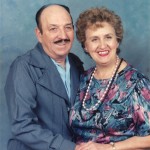
 precious great grandbabies and great great grandbabies. Oh, how I wish we could call them. There is so much I would like to tell them. If only Heaven had a telephone. While I miss you so much on this day, in particular, Mom, I know that you and Dad are having the most amazing time in Heaven, and you can’t wait for all of us to get there…where we will realize why Heaven doesn’t have a telephone. When we are all there, we will never need telephones again. What an awesome day that will be. We love and miss you Mom…and Dad too. See you both someday soon…and we can hardly wait.
precious great grandbabies and great great grandbabies. Oh, how I wish we could call them. There is so much I would like to tell them. If only Heaven had a telephone. While I miss you so much on this day, in particular, Mom, I know that you and Dad are having the most amazing time in Heaven, and you can’t wait for all of us to get there…where we will realize why Heaven doesn’t have a telephone. When we are all there, we will never need telephones again. What an awesome day that will be. We love and miss you Mom…and Dad too. See you both someday soon…and we can hardly wait.
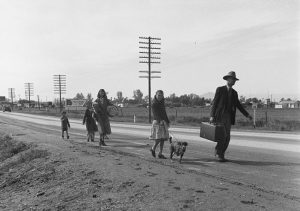
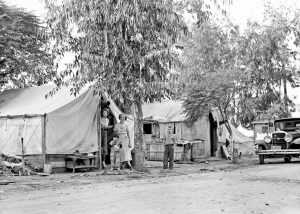 The “Dust Bowl” was an environmental disaster that hit the Midwest in the 1930s. A combination of a severe water shortage and harsh farming techniques caused the disaster. Some scientists believe it was the worst drought in North America in 300 years. The lack of rain killed the crops that kept the soil in place. When winds blew, they raised enormous clouds of dust. It deposited mounds of dirt on everything, even covering houses. With the Dust Bow came the failure of many farms in the Midwest, and the people had no choice but to move, in order to find a way to make a living.
The “Dust Bowl” was an environmental disaster that hit the Midwest in the 1930s. A combination of a severe water shortage and harsh farming techniques caused the disaster. Some scientists believe it was the worst drought in North America in 300 years. The lack of rain killed the crops that kept the soil in place. When winds blew, they raised enormous clouds of dust. It deposited mounds of dirt on everything, even covering houses. With the Dust Bow came the failure of many farms in the Midwest, and the people had no choice but to move, in order to find a way to make a living.
I suppose that the invasion that followed might have been similar to the current refugees. It wasn’t just one family that moved, but hundreds of families. Los Angeles Police Chief James E. Davis, seeking to halt the “invasion” of dust-bowl Depression refugees in February, 1936, declared a “Bum Blockade” to stop the mass emigration of poverty stricken families fleeing from the dust-torn states of the Midwest. These days, he would have met with severe criticism, not so much for the blockade, as for the name of the blockade.
By 1934, 75% of the United States was severely affected by this terrible drought. The region most affected was the Great Plains, and included more than 100 million acres, centered in Oklahoma, the Texas Panhandle, Kansas, and parts of Colorado and New Mexico. These millions of acres of farmland became useless and soon, hundreds of thousands of people were forced to leave their homes. Many of these destitute families packed up their belongings and migrated west, hoping to find work and a better life, about 200,000 of which were California bound. Instead of finding the promised land of their dreams, however, they found that the available labor pool was vastly disproportionate to the number of job openings that could be filled. Migrants who found employment soon learned that this surplus of workers caused a significant reduction in the going wage rate, and even when the entire family worked, they were unable to support themselves.
Many set up “ditchbank” camps along irrigation canals in the farmers’ fields, which brought with them poor sanitary conditions and created a public health problem. And, of those who could find work in agriculture, it did not put an end to their travels. Instead, their lives were characterized by transience, if they wanted to maintain a steady income, which required them to follow the various harvests around the state. In the meantime, California was overwhelmed, trying to figure out how to absorb as many as 6,000 migrants crossing its borders daily. Also feeling the effects of the Depression, California infrastructures were already overburdened, and the steady stream of newly arriving migrants was more than the system could bear. Though these refugees came from a number of states, Californians often lumped them together as “Okies” or “Arkies,” who became the butt of derogatory jokes and the focus of political campaigns in which candidates made them the scapegoat for a shattered economy. They were accused of many crimes, as well as shiftlessness, lack of ambition, school overcrowding and stealing jobs from native Californians.
California’s Indigent Act was passed in 1933, which made it a crime to bring indigent persons into the state, Davis contended that his men needed no special approval because “any officer has the authority to enforce the state law.” Asking border-county sheriffs to deputize his officers, most complied. However, some refused, including Modoc County, who forced 14 LAPD officers to leave after they turned away local residents trying to 
 return home. On August 24, 1935, the Los Angeles Herald-Express ran an article warning emigrants to stay away from California. It read: Stay Away From California: Warning To Transient Hordes. Those days were very different from the California of today, and not in a good way. I don’t agree with derogatory name calling, but common sense tells us that sometimes you have to try to stop a flood, even if it’s a flood of people.
return home. On August 24, 1935, the Los Angeles Herald-Express ran an article warning emigrants to stay away from California. It read: Stay Away From California: Warning To Transient Hordes. Those days were very different from the California of today, and not in a good way. I don’t agree with derogatory name calling, but common sense tells us that sometimes you have to try to stop a flood, even if it’s a flood of people.

